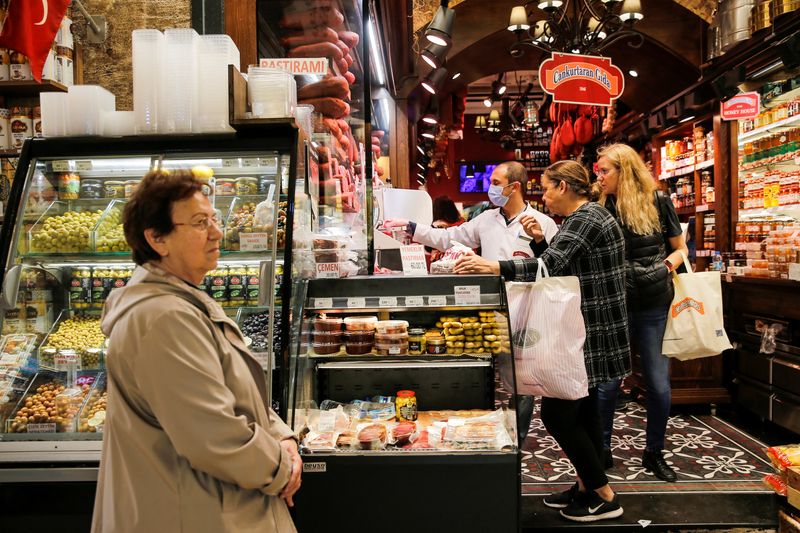By Ali Kucukgocmen
ISTANBUL (Reuters) - Turkey's monthly inflation was seen at 4.84% in June, partly due to the lira's sharp decline after elections last month, a Reuters poll showed on Monday, but the annual reading was expected to decline slightly to 39.47%.
The median estimate of 11 economists for the monthly inflation in June was for a rise of 4.84%, with forecasts ranging between 2.50% and 5.50%. The rise was partly due to the lira's 23.3% decline since President Tayyip Erdogan won re-election on May 28.
Other factors that contributed to the monthly rise was a general rise in prices across the board, including hikes to petrol, precious metals, services sector, cars and tobacco, economists said.
Annual inflation was expected to stand at 39.47%, down slightly from 39.59% in May, with forecasts for this month ranging between 36.30% and 40.30%.
Annual inflation recorded more than a 4-point drop in May after Ankara's provision of free natural gas that month offset other price rises, while a measure of inflation that excludes energy prices rose again.
Turkey's economic authorities have taken steps toward returning to orthodoxy since Erdogan was re-elected last month, including the central bank's 650 basis-point rate hike last Thursday, which brought its policy rate to 15%.
The tightening remained below market expectations, with the Reuters poll median forecast being for a hike to 21%.
The central bank has also simplified some of the macroprudential measures it had implemented in a drive to boost the lira and stopped tapping its reserves to support the currency, which has lost more than 80% of its value since 2018 despite interventions.
The lira's decline was expected to continue, which is in turn reflected in domestic prices, stoking inflation in import-dependent Turkey.
The bank has promised more "gradual" tightening, adding that indicators point to a rise in the underlying trend of inflation.
The median estimate for annual inflation at year-end stood at 51.50%, with the forecasts of eight economists ranging between 38.60% and 55.30%.
Inflation surged after a late-2021 currency crisis that was sparked by rate cuts that Erdogan had called for, based on his view that interest rates cause inflation. Annual inflation touched a 24-year peak of 85.51% in October before easing.
Investors see the recent moves by the central bank as a sign of Turkey's return to orthodoxy. But they are not convinced that new Governor Hafize Gaye Erkan, a former Wall Street banker, has full autonomy under Erdogan, who has eroded the central bank's independence in recent years.

The Turkish Statistical Institute will announce June inflation data at 0700 GMT on July 5.
($1 = 19.5047 liras)